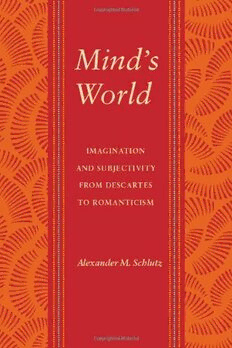
Mind's World: Imagination and Subjectivity from Descartes to Romanticism (Literary Conjugations) PDF
332 Pages·2009·1.904 MB·English
Most books are stored in the elastic cloud where traffic is expensive. For this reason, we have a limit on daily download.
Preview Mind's World: Imagination and Subjectivity from Descartes to Romanticism (Literary Conjugations)
Description:
Imagination is unruly. It creates the mind's world, linking the sensory realm to the realm of the intellect by oscillating between mind and body, self and world, ideal and real. It has been construed as both essential to rational thought and as a dangerous impediment to it. Alexander Schlutz demonstrates that this ambivalence in conceptions of imagination informs fundamental philosophical and aesthetic projects of European modernity. By analyzing the discourse about imagination in the philosophical systems of Plato, Aristotle, Descartes, Kant, and Fichte, as well as in the works of the Romantic poet-philosophers von Hardenberg (Novalis) and Coleridge, who champion discourse about imagination as a prime aesthetic and poetic principle, Schlutz explores how the imagination is haunted by the presence of the faculty's dark twin, fantasy, which is conceived as a danger (rather than a supplement) to human rationality and hence threatens to undermine the Cartesian subject that is grounded in rational, logical thought. Alexander M. Schlutz is associate professor of English at John Jay College, City University of New York.
See more
The list of books you might like
Most books are stored in the elastic cloud where traffic is expensive. For this reason, we have a limit on daily download.
